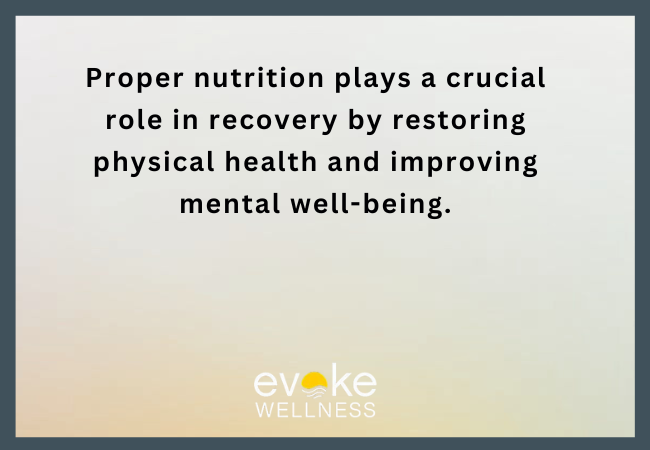Recovery from addiction is a multifaceted journey that extends beyond detoxification and therapy. True healing requires addressing the mind, body, and spirit, ensuring that individuals regain balance and overall well-being. Holistic approaches in residential rehab integrate evidence-based treatments with complementary therapies like nutrition, exercise, and mindfulness to foster long-term recovery. At Evoke Wellness Ohio, we believe that incorporating these holistic elements enhances traditional recovery methods, helping individuals build a strong foundation for a healthier and more fulfilling life.
Addiction takes a significant toll on the body and mind, depleting essential nutrients, disrupting sleep cycles, and leading to mental health challenges such as anxiety and depression. A well-rounded treatment plan at an addiction treatment center in Ohio should incorporate strategies that promote physical and emotional restoration. This guide explores the role of nutrition, exercise, and mindfulness in substance abuse treatment in Ohio, highlighting their importance in achieving sustainable recovery.
What is Holistic Healing in Residential Rehab?
Holistic healing in residential rehab addresses the mind, body, and spirit to promote whole-person recovery. While traditional addiction treatment focuses on therapy and medical detox, holistic rehab integrates nutrition, fitness, mindfulness, and wellness practices to strengthen both physical and emotional resilience.
Holistic rehab programs combine:
- Medical detox and therapy (Cognitive Behavioral Therapy, DBT, group therapy)
- Physical wellness (exercise, yoga, and fitness routines)
- Nutritional support (balanced diets to restore health)
- Mindfulness and meditation (reducing stress and enhancing emotional stability)
By incorporating nutrition, exercise, and mindfulness, holistic rehab helps individuals rebuild their physical health, improve mental clarity, and reduce relapse risk.
Role of Nutrition in Recovery
How Addiction Affects Nutritional Health
Substance abuse can severely impact an individual’s nutritional status, leading to deficiencies that affect physical and mental well-being. Alcohol, opioids, and stimulants often reduce appetite, impair nutrient absorption, and deplete essential vitamins and minerals. Malnutrition can result in weakened immunity, mood instability, and chronic fatigue, all of which can make recovery more challenging.
Some common nutritional deficiencies caused by addiction include:
- Vitamin B deficiencies (B1, B6, and B12) leading to fatigue, nerve damage, and cognitive issues.
- Amino acid deficiencies, affecting neurotransmitter production and mood regulation.
- Electrolyte imbalances, which can cause dehydration, muscle weakness, and heart complications.
- Low levels of omega-3 fatty acids, which contribute to mental health disorders such as depression and anxiety.
Nutritional Strategies for Healing
Proper nutrition in residential treatment in Ohio focuses on replenishing lost nutrients and restoring physical health. A well-balanced diet can enhance brain function, boost energy levels, and regulate mood, all of which are crucial during recovery.
Essential Nutrients for Recovery
- Protein: Supports neurotransmitter function and muscle repair.
- Complex carbohydrates: Stabilize blood sugar levels and improve energy.
- Healthy fats: Promote brain health and reduce inflammation.
- Vitamins and minerals: Support overall body function and immune health.
A structured meal plan should emphasize whole foods such as lean proteins, whole grains, fruits, vegetables, and healthy fats. Hydration is also crucial, as dehydration is common among those recovering from addiction. Drinking enough water and consuming electrolyte-rich foods can improve energy and detoxification.
Benefits of Nutrition in Recovery
- Improves mood stability and reduces cravings
- Boosts cognitive function and mental clarity
- Strengthens the immune system
- Restores physical energy and stamina
- Reduces inflammation and promotes gut health
A comprehensive nutritional approach ensures that individuals in recovery have the strength and resilience to manage withdrawal symptoms, stress, and emotional triggers more effectively.
Power of Exercise in Recovery
How Exercise Supports Recovery
Physical activity is a cornerstone of holistic recovery at an addiction treatment center in Ohio. Exercise has been proven to reduce stress, improve mood, and enhance overall physical health. It plays a vital role in helping individuals rebuild their strength, regulate emotions, and develop positive routines.
Types of Exercise for Recovery
Engaging in regular physical activity doesn’t have to be strenuous. Various forms of exercise can be tailored to individual fitness levels and interests.
Aerobic Exercise
- Running, cycling, or swimming improves cardiovascular health and releases endorphins.
- Reduces stress and enhances mood stability.
Strength Training
- Builds muscle mass and increases metabolism.
- Enhances self-discipline and confidence.
Yoga and Stretching
- Improves flexibility, reduces tension, and enhances mindfulness.
- Supports relaxation and emotional balance.
Outdoor Activities
- Hiking, walking, or team sports provide social engagement and mental refreshment.
- Encourages connection with nature and a sense of accomplishment.
Benefits of Exercise in Recovery
- Reduces cravings and relapse risk
- Enhances self-esteem and body image
- Improves sleep quality
- Promotes stress relief and mental clarity
- Strengthens the immune system and physical resilience
By incorporating exercise into daily routines, individuals in residential rehab can develop healthier coping mechanisms that replace substance use.
Role of Mindfulness in Recovery
What is Mindfulness?
Mindfulness is the practice of being fully present and aware of thoughts, emotions, and sensations without judgment. This technique is a powerful tool in addiction recovery, helping individuals gain control over cravings, reduce stress, and develop emotional resilience.
Mindfulness Practices for Recovery
- Meditation: Focused breathing exercises that promote relaxation and emotional awareness.
- Journaling: Writing down thoughts and emotions to identify triggers and patterns.
- Breathwork: Deep breathing exercises that reduce anxiety and improve focus.
- Guided Imagery: Visualization techniques that create a sense of calm and motivation.
- Mindful Eating: Encourages individuals to develop a healthier relationship with food and nutrition.
Benefits of Mindfulness in Recovery
- Enhances self-awareness and emotional regulation
- Reduces stress, anxiety, and depression
- Improves focus and decision-making
- Strengthens resilience against triggers and cravings
- Promotes overall well-being and long-term sobriety
By integrating mindfulness techniques into daily life, individuals in residential treatment in Ohio can cultivate inner peace and emotional strength, making them more equipped to handle life’s challenges.
Conclusion
Holistic healing is essential in addiction recovery, ensuring that individuals heal not just physically but also mentally and emotionally. At Evoke Wellness Ohio, we integrate nutrition, exercise, and mindfulness into our comprehensive treatment programs, providing a well-rounded approach that fosters long-term recovery.
By focusing on proper nutrition, individuals can restore their physical health and mental clarity. Incorporating exercise into daily routines promotes emotional stability and self-confidence. Mindfulness practices offer valuable tools for stress management and emotional resilience. Together, these holistic approaches complement traditional therapies, helping individuals regain control of their lives and maintain sobriety.
If you or a loved one is seeking support for addiction, our team at Evoke Wellness Ohio is here to help. Contact us today at 866.430.9267 to learn more about our holistic treatment options and start your journey toward healing.
Frequently Asked Questions (FAQs)
Why is nutrition important in addiction recovery?
Nutrition plays a crucial role in restoring physical health, replenishing essential nutrients, and stabilizing mood. A balanced diet helps improve cognitive function, energy levels, and overall well-being, making it easier for individuals to sustain long-term recovery.
How does exercise help in overcoming addiction?
Exercise releases endorphins, which improve mood, reduce stress, and lower the risk of relapse. It also helps rebuild physical strength, enhances self-esteem, and promotes better sleep patterns, all of which contribute to successful recovery.
What are some mindfulness practices used in addiction recovery?
Common mindfulness practices include meditation, journaling, breathwork, guided imagery, and mindful eating. These techniques help individuals manage stress, cravings, and emotional triggers more effectively.
Can holistic approaches replace traditional addiction treatments?
Holistic approaches complement traditional addiction treatments but do not replace them. They enhance recovery by addressing the physical, emotional, and mental aspects of addiction, working alongside evidence-based therapies like counseling and medication-assisted treatment.
How can I start a holistic recovery journey at Evoke Wellness Ohio?
Evoke Wellness Ohio offers a comprehensive residential rehab program that integrates nutrition, exercise, and mindfulness into personalized treatment plans. Contact us at 866.430.9267 to learn more about our holistic approach and start your recovery journey today.



